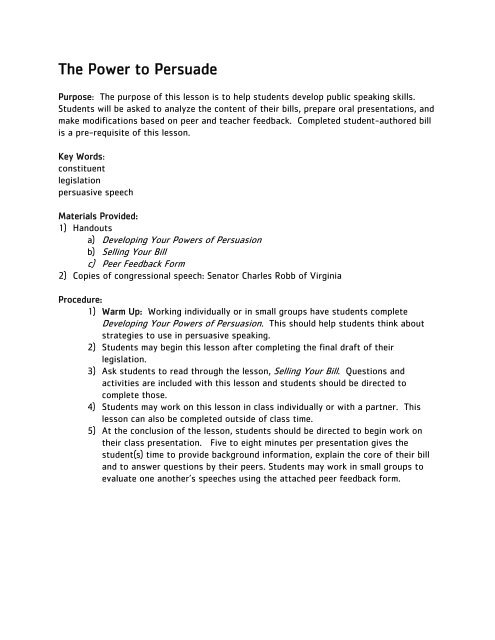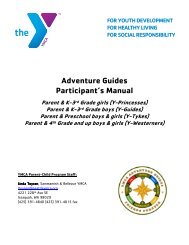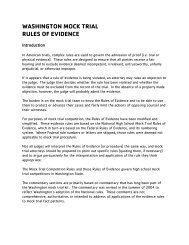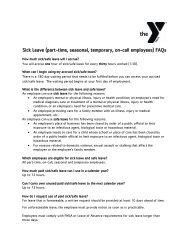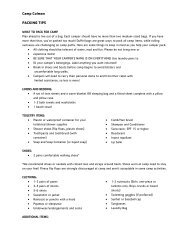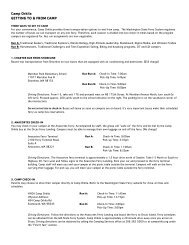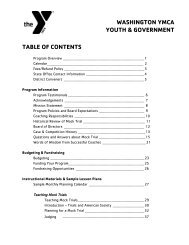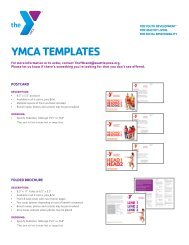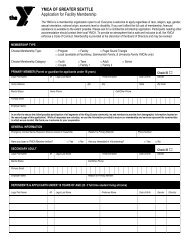The Power to Persuade - YMCA of Greater Seattle
The Power to Persuade - YMCA of Greater Seattle
The Power to Persuade - YMCA of Greater Seattle
You also want an ePaper? Increase the reach of your titles
YUMPU automatically turns print PDFs into web optimized ePapers that Google loves.
<strong>The</strong> <strong>Power</strong> <strong>to</strong> <strong>Persuade</strong>Purpose: <strong>The</strong> purpose <strong>of</strong> this lesson is <strong>to</strong> help students develop public speaking skills.Students will be asked <strong>to</strong> analyze the content <strong>of</strong> their bills, prepare oral presentations, andmake modifications based on peer and teacher feedback. Completed student-authored billis a pre-requisite <strong>of</strong> this lesson.Key Words:constituentlegislationpersuasive speechMaterials Provided:1) Handoutsa) Developing Your <strong>Power</strong>s <strong>of</strong> Persuasionb) Selling Your Billc) Peer Feedback Form2) Copies <strong>of</strong> congressional speech: Sena<strong>to</strong>r Charles Robb <strong>of</strong> VirginiaProcedure:1) Warm Up: Working individually or in small groups have students completeDeveloping Your <strong>Power</strong>s <strong>of</strong> Persuasion. This should help students think aboutstrategies <strong>to</strong> use in persuasive speaking.2) Students may begin this lesson after completing the final draft <strong>of</strong> theirlegislation.3) Ask students <strong>to</strong> read through the lesson, Selling Your Bill. Questions andactivities are included with this lesson and students should be directed <strong>to</strong>complete those.4) Students may work on this lesson in class individually or with a partner. Thislesson can also be completed outside <strong>of</strong> class time.5) At the conclusion <strong>of</strong> the lesson, students should be directed <strong>to</strong> begin work ontheir class presentation. Five <strong>to</strong> eight minutes per presentation gives thestudent(s) time <strong>to</strong> provide background information, explain the core <strong>of</strong> their billand <strong>to</strong> answer questions by their peers. Students may work in small groups <strong>to</strong>evaluate one another’s speeches using the attached peer feedback form.
Developing Your <strong>Power</strong>s <strong>of</strong> PersuasionRead each <strong>of</strong> the following situations carefully. Record your answers <strong>to</strong> each <strong>of</strong> thequestions and be prepared <strong>to</strong> share your responses with your classmates.Situation One: You and your classmates would like your school <strong>to</strong> sponsor a trip <strong>to</strong>Washing<strong>to</strong>n, DC. How can you persuade your principal that this trip is a good idea?• What are two objections your principal might have <strong>to</strong> this trip?• How can you respond <strong>to</strong> each <strong>of</strong> these objections?Situation Two: You notice a group <strong>of</strong> classmates teasing and harassing a much youngerstudent. This student is clearly getting very upset. How can you persuade them <strong>to</strong> s<strong>to</strong>p?• What are two negative reactions your classmates might have <strong>to</strong> your intervention?• How can you prevent such negative reactions?Situation Three: You and a group <strong>of</strong> friends would like <strong>to</strong> go <strong>to</strong> a movie on Saturday night.You don’t have a car <strong>of</strong> your own, but sometimes your parents let you borrow theirs. Howwill you persuade your parents <strong>to</strong> let you borrow the car?• What are two reasons your parents might give for you not using the car?• How can you be prepared <strong>to</strong> address each <strong>of</strong> these concerns?Based on these situations, what are three ways anyone giving a persuasive speech canprepare?1)2)3)
Selling Your BillPublic Speaking GuidelinesPublic speaking is an important skill for a delegate since there are many demands on them <strong>to</strong> sharetheir ideas and persuade others <strong>of</strong> their views. Delegates also need strong public speaking skillswhen presenting their bill. Your goal during your presentation <strong>to</strong> your delegation is <strong>to</strong> inform anddefend the merits <strong>of</strong> your bill and <strong>to</strong> persuade them <strong>to</strong> support it with their vote. Use the publicspeaking guidelines below <strong>to</strong> help you prepare for your oral presentation.KnowYourContent~ Research your bill as exhaustively as possible~ Know your side <strong>of</strong> the issue as well as opposing positions~ Organize your thoughts in<strong>to</strong> a problem, solution and benefits~ Be persuasive by appealing <strong>to</strong> the needs <strong>of</strong> your audience~ Include visual aides such as charts and graphs <strong>to</strong> show projections for the futureHow <strong>to</strong> improve the content <strong>of</strong> your presentation~ Read it aloud <strong>to</strong> yourself and ask the following questionso Does it make sense?o Is it persuasive?o Is your message clear?~ Read the speech given by former Virginia Sena<strong>to</strong>r Chuck Robb and answer thefollowing questions.o How does he begin the speech and why is his approach effective?o What type <strong>of</strong> persuasive language does he use in his speech?o Can you apply either <strong>of</strong> the observations made above <strong>to</strong> yourspeech?Senate ChambersMarch 28, 2000…Mr. President, when I came home from Vietnam a little over thirty years ago, I camehome <strong>to</strong> a nation divided. I was assigned by the U.S. Marine Corps <strong>to</strong> head up a major <strong>of</strong>ficerrecruiting program on college campuses all across America. It was 1969 and anti-war feverwas consuming the nation. As you can imagine, my Marine uniform on a college campusbecame a lightning rod for protests and protesters. In this assignment, Mr. President,incoming bullets, rockets and artillery were replaced by insults, jeers and demonstrations…But Mr. President, I rise <strong>to</strong>day <strong>to</strong> defend the rights <strong>of</strong> those individuals 30 years ago <strong>to</strong>protest me and my uniform. Freedom <strong>of</strong> speech is the foundation <strong>of</strong> our democracy--andsilencing that speech would have been against everything I had fought for in Vietnam. Toparaphrase an old saying: I didn't agree with what they said. But I had been willing <strong>to</strong> die <strong>to</strong>protect their right <strong>to</strong> say it.Mr. President, I am repulsed by any individual who would burn the flag <strong>of</strong> my country <strong>to</strong>convey a message <strong>of</strong> dissent. It is an act I abhor and can barely comprehend. But in thedemocracy that our forefathers founded, and that generations <strong>of</strong> Americans have fought and
died <strong>to</strong> preserve, I simply do not have the right <strong>to</strong> decide how another individual expresses hisor her political views. I can abhor those political views, but I cannot imprison someone forexpressing them. That's a fundamental tenet <strong>of</strong> democracies and its what makes America theenvy <strong>of</strong> the world, as the home <strong>of</strong> the free and the brave.Last week, I received an e-mail from a retired U.S. Marine Corps Colonel from Virginia.Like many Americans (and many American veterans), he had struggled with this issue andsearched his conscience for what's right. In his message <strong>to</strong> me, he said: "I have seen our flag<strong>to</strong>rn in battle, captured by our enemies, and trampled on by protesters. In all those events Inever felt that the American way <strong>of</strong> life was in grave peril... for whenever our flag fell or wasdestroyed there was always another Marine <strong>to</strong> step forward and pull a replacement from hishelmet or ruck sack.''He continued: "<strong>The</strong> Constitution is the bedrock <strong>of</strong> America, the nation... the people. It isnot possible <strong>to</strong> pull another such document from our national ruck sack.' We have but oneConstitution, and it should be the object <strong>of</strong> our protection…''…Mr. President, since speech that enjoys the support <strong>of</strong> the majority is never likely <strong>to</strong>be limited, the Bill <strong>of</strong> Rights, by its very design, protects the rights <strong>of</strong> a minority in key areasthat the founders held dear. And it is the freedom <strong>to</strong> dissent peacefully that separates thegreatest democracy the world has ever known from other regimes like those in China, Cuba,Iraq, and others where political dissent has been met with imprisonment and sometimes death.If we reach past our natural anger and disgust for a few publicity-hungry flag-burners,we know in our hearts that a great nation like ours, a nation that defends liberty all over theworld, should not imprison individuals who exercise their right <strong>to</strong> political dissent. And weknow in our hearts that a few repulsive flag-burners pose no real danger <strong>to</strong> a nation as greatas ours.Mr. President, I want that flag <strong>to</strong> be the proud symbol <strong>of</strong> a nation that is truly free.And for it <strong>to</strong> be that proud symbol, we must also protect the sacred freedoms placed in thefirst amendment <strong>of</strong> the Constitution by our forefathers.I say that because the flag represents freedom <strong>to</strong> me. But the first amendmentguarantees that freedom. And when we seek <strong>to</strong> punish those who express views we don'tshare, then we--not the flag burners--we begin <strong>to</strong> erode the very values, the very freedoms,that make America the greatest democracy the world has ever known. I support our flag, andthe republic for which it stands. But I cannot, with the faith I have in that republic, supportthis constitutional amendment.VaryYourVoice~ Volume - Be sure you can be heard without shouting~ Tone - Your voice <strong>to</strong>ne may represent enthusiasm, fear, sorrow or anotheremotion. Be sure you are using a <strong>to</strong>ne appropriate <strong>to</strong> your presentation~ Pitch - Is your voice <strong>to</strong>o high or <strong>to</strong>o low? Can you manipulate it for clearerunderstanding and fewer distractions?~ Pace - Speak slowly so your audience can understand your messageHow <strong>to</strong> improve your voice~ Listen <strong>to</strong> your voice!~ Practice your presentation and moni<strong>to</strong>r your voice
~ Tape your presentation and evaluate your voice for volume, <strong>to</strong>ne,pitch and paceMaintainPositivePosture~ Eye contac<strong>to</strong> Maintain eye contact with your audience in order <strong>to</strong> communicate yourinterest in their ideas and a willingness <strong>to</strong> engage them in conversation~ Facial Expressiono Smile when appropriate <strong>to</strong> convey warmth and comfort with your <strong>to</strong>pic.~ Gestureso Balance your use <strong>of</strong> gestures. Too many wild gestures may be a distractionfrom your message and <strong>to</strong>o few may seem stiff and unnatural.How <strong>to</strong> improve your posturePractice reading your presentation three times. It will be helpful <strong>to</strong>practice with a partner or in front <strong>of</strong> a mirror in order <strong>to</strong> receiveimmediate feedback.o During the first reading, focus on making eye contact.o During the second, be aware <strong>of</strong> your facial expressions.o On the third reading pay attention <strong>to</strong> your gestures.Making Your Casea. Opening Statementsi. States the purpose <strong>of</strong> your piece <strong>of</strong> legislationii. Clears up any confusing vocabulary at the beginning <strong>of</strong> debateiii. States your opinion or why you wrote the billiv. Is clear and conciseb. Closing Statementi. Clears up any confusion causes by people speaking out on your billii. Restates pivotal pointsiii. Responds <strong>to</strong> untrue statements made by legisla<strong>to</strong>rsiv. Is clear and concisec. Bill FAQ Sheeti. Write down all <strong>of</strong> the commonly asked questions about your bill and <strong>to</strong> come upwith good answers <strong>to</strong> those questions so that you can be prepared in the futureii. Keep it in front <strong>of</strong> you during debate so that you can reference it quickly.


